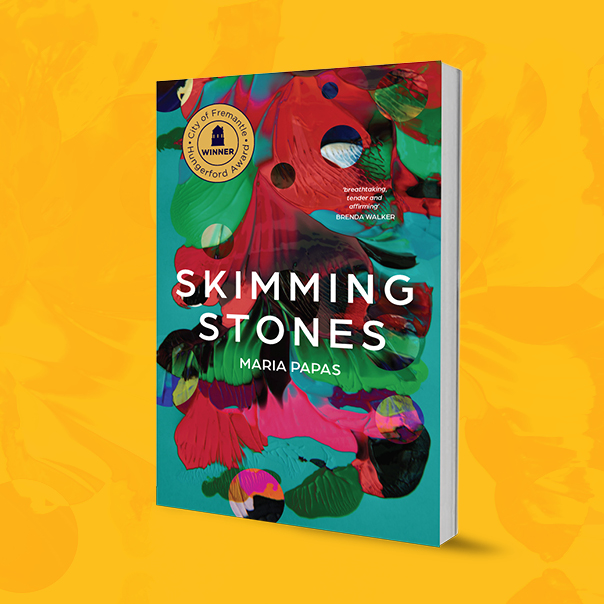City of Fremantle Hungerford Award winner Maria Papas shares why stories will always be important to her

Described as ‘breathtaking’, ‘wise’ and ‘poetic’, Maria Papas’s City of Fremantle Hungerford Award winning novel Skimming Stones explores the impact of childhood illness and trauma on families. Set in a paediatric oncology ward and at Lake Clifton in Australia’s South West, Skimming Stones is about a nurse named Grace, who cares for and guides her young patients, but must also navigate her own past as a child who once bore witness to her sister’s leukaemia. In this blog, Maria talks about the importance of sharing stories.
I come from a family of storytellers. My grandmother used to chat about how she fell in love with my grandfather, what it was like to say goodbye when he set sail for Australia and how she followed (with five boys in tow) more than two years later. My grandfather loved a good war story. I still see him clearly–young, fossicking for salt on his Nazi-occupied island, cold barrel of a gun to his head because he was without his papers. I heard a lot of stories when I was young, and in these stories, there were romances, wars and rebels who hid in forests. I heard fables, myths and even horrors about graverobbers and dead princesses who came looking for retribution. There was nothing I loved more than to listen to a story. Stories taught me who I was. They taught me my culture, my history, my heritage. Above all, stories showed me how I belonged.
When I started school, I spoke no English, but my love of stories quickly transformed into a love of learning. I borrowed a lot from our school library, my mum never said ‘no’ to buying books and my dad used to fill our house with everything from encyclopedias to serialised Disney stories. It was important to my parents that my siblings and I read. Reading was an opportunity and a luxury they never felt they had.
I’m a writer and a teacher now, and there is one piece of research that sits close to my heart, mostly because I know it to be true: young people who read for enjoyment will always do better in school. But it’s more than educational outcomes and it’s more than reading for me. It’s the sharing of stories, of experience. Stories teach us to be human. They teach us to see the world from different perspectives. To relate.
My novel, Skimming Stones, came from a time when I was all but living at hospital with my child. Back then, I remember wanting so much to find the narrative that made sense. I wanted to jump forward into the future so I could look back onto this past and see that everything turned out okay. I guess I desired the fiction that could show me what I needed in the same way my parents’ and grandparents’ stories once showed me who I was. For the first time in my life, however, I wasn’t looking for a hero-type who would overcome their troubles. I was looking instead for the shape of language, the structures of repetition, and the time shifts between future, past and present. I was looking for these things because I wanted to see that the uncertainty I felt was normal. To my mind, this is where fiction comes in. The right fiction will allow a reader to step into the work and find themselves within the pages. We celebrate the stories in which our main characters reach the end triumphantly, but we also can’t lose sight of the other stories too, the ones that show us we’re not alone in our experiences. One reviewer wrote that Skimming Stones ‘deftly illuminates the looping effect of childhood illness and trauma on future lives.’ I’ve read this line a few times now because when I decided to write this novel, it was precisely this looping I most wanted to articulate. Stories of illness or trauma do not happen in a linear way. The shock associated with such frightening occurrences does not simply disrupt one’s equilibrium, nor is it a disruption that can easily be overcome on the way to some finer life purpose that offers closure. Instead, those who have experienced these things must somehow learn to recognise them, must begin to assimilate them into their fabric of their lives and must steady themselves when they see and read these experiences in the stories carried on other people’s faces.
When we share stories (whether we tell, hear, write, read or express them via artworks, music dance or other means), we humanise our world. We create community. We teach and learn and reassess how we interpret things. We find comfort. This is why stories will always be important to me.

Maria Papas’s novel Skimming Stones is available in all good bookstores and online.



